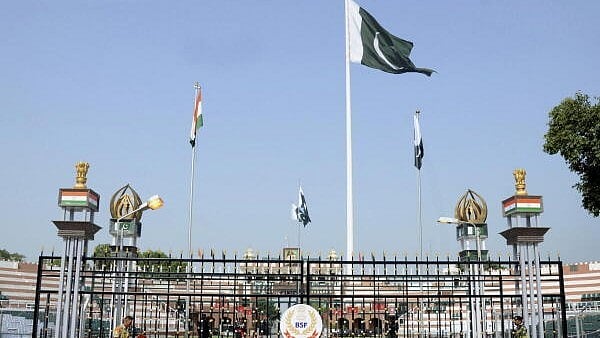
In this Saturday, August 14, 2021 file image, BSF jawans guard on the eve of India's 75th Independence Day at the India-Pakistan Attari-Wagah border post, some 40 km from Amritsar. The Cabinet Committee on Security decided to close the Integrated Check Post at Attari with immediate effect on Wednesday, April 23, 2025, after the Pahalgam terror attack.
Credit: PTI Photo
New Delhi: Islamabad on Thursday not only suspended the 1972 Shimla Agreement, as well as all its other pacts with New Delhi, but also warned that any move by India to stop the water of the transboundary Indus River System from flowing into Pakistan would be deemed as “an Act of War”.
Pakistan also closed its airspace for aircraft owned or operated by entities based in India.
Prime Minister Shehbaz Sharif’s government in Islamabad retaliated a day after New Delhi put in abeyance the India-Pakistan Indus Water Treaty and announced a series of other measures in response to the killing of 26 people at Pahalgam in Jammu and Kashmir by the terrorists owing allegiance to the Lashkar-e-Tayyiba based in the neighbouring country.
New Delhi’s acting envoy to Islamabad, Geetika Srivastava, was summoned to the Ministry of Foreign Affairs, where Pakistan’s senior diplomats conveyed to her the decision taken in retaliation to the measures announced by India. An unruly mob also staged a protest in front of the High Commission of India in Islamabad.
Sharif chaired a meeting of the National Security Council (NSC) on Thursday. The chief of the Pakistan Army, General Asim Munir, and other senior military officials were present in the meeting, which was convened to discuss Islamabad’s options to respond to the measures announced by New Delhi late on Wednesday. The council termed India’s actions against Pakistan as “unilateral, unjust, politically motivated, extremely irresponsible and devoid of legal merit”.
“Any attempt (by India) to stop or divert the flow of water belonging to Pakistan as per the Indus Waters Treaty, and the usurpation of the rights of lower riparian will be considered as an Act of War and responded with full force across the complete spectrum of national power,” Sharif’s office said in a statement issued after the meeting. Pakistan rejected India’s decision to put in abeyance the Indus Water Treaty (IWT). “Water is a vital national interest of Pakistan, a lifeline for its 240 million people, and its availability will be safeguarded at all costs," it said.
After a meeting of the Cabinet Committee of Security chaired by Prime Minister Narendra Modi in New Delhi, India announced its decision to put in abeyance the IWT until Pakistan would “credibly and irrevocably” abjure its support for cross-border terrorism. The treaty, which India inked with Pakistan on September 19, 1960, granted control over the three “eastern rivers” of the Indus River System – Beas, Ravi, and Sutlej – with an average annual flow of 33 million acre-feet (MAF) to India, while control over the three “western rivers” – Indus, Chenab, and Jhelum – with an average annual flow of 136 MAF had been given to Pakistan.
The treaty survived several flashpoints in the perpetual conflict between the two nations, including the 1965 and 1971 wars, as well as the 1999 Kargil Conflict. New Delhi, however, in 2023 and 2024 sent two notices to Islamabad seeking review and modification of the IWT.
“Pakistan shall exercise the right to hold all bilateral agreements with India, including but not limited to the Shimla Agreement, in abeyance, till India desists from its manifested behaviour of fomenting terrorism inside Pakistan; trans-national killings; and non-adherence to international law and UN Resolutions on Kashmir,” Pakistani Prime Minister’s Office said in a statement.
The 1972 Shimla Agreement between India and Pakistan provided for respect for each other’s territorial integrity and sovereignty, non-interference in each other’s internal affairs and settlement of differences by peaceful means through bilateral negotiations. It stipulated that pending settlement of the bilateral issues, neither side would unilaterally alter the situation or violate the Line of Control in J&K. The agreement envisaged further discussions for normalisation of the bilateral relations, including for a final settlement of J&K.
Like India, Pakistan also announced the closure of the Attari-Wagah Integrated Check Post (ICP) with immediate effect and set April 30 as the deadline for the citizens of India, who entered Pakistan through the ICP, to return. Islamabad also announced the suspension of “all trade with India, including to and from any third country through Pakistan”.
Pakistan also suspended all travel documents granted to the citizens of India under the SAARC Visa Exemption Scheme (SVES), except for Sikh religious pilgrims, and asked them to return within 48 hours. India had also announced a similar decision for the citizens of Pakistan in its territory.
Like India, Pakistan also declared the Indian defence, naval and air advisors in Islamabad persona non grata, directing them to leave “immediately but not later than 30 April 2025”.
